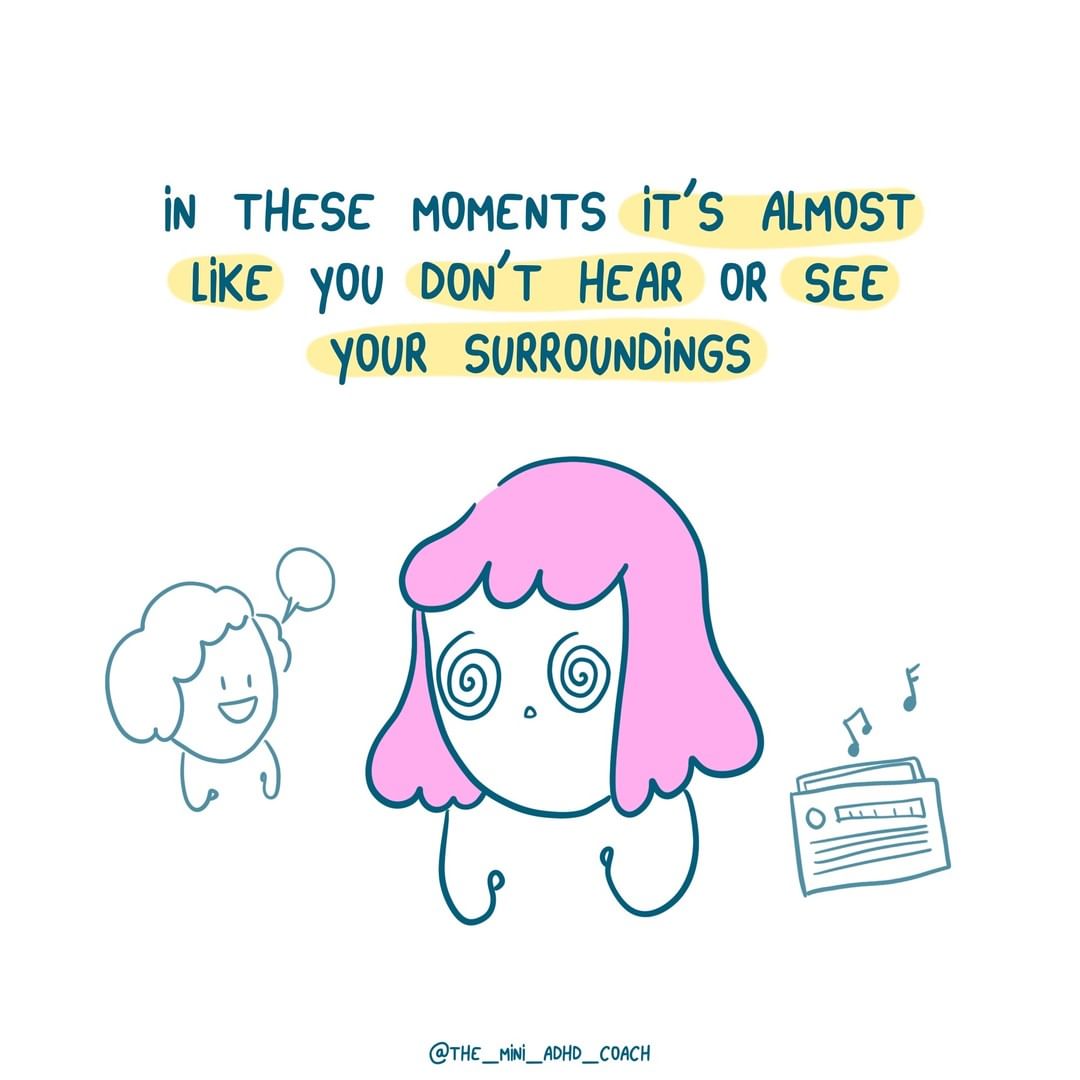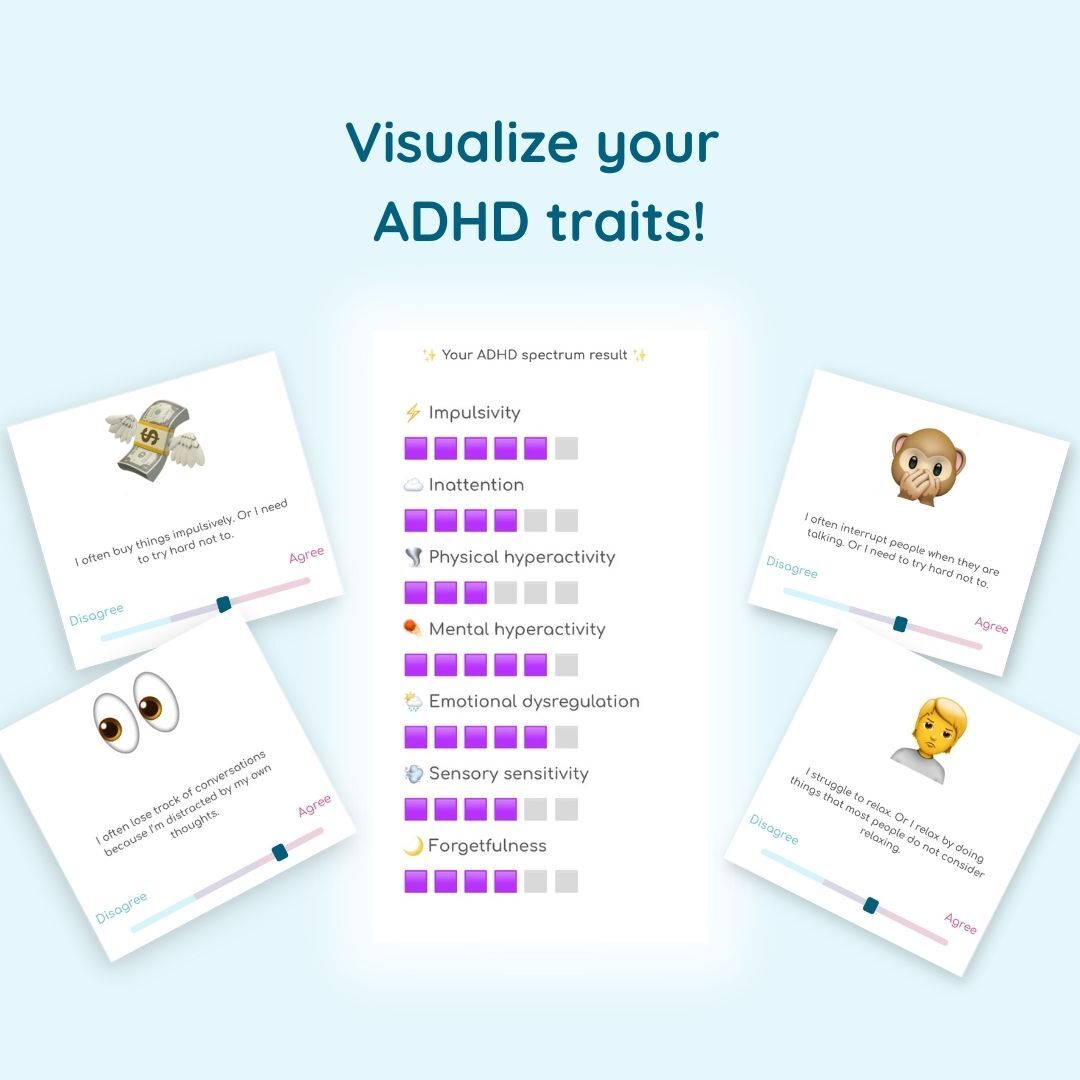Oops, I Lost Track Of The Present Moment… Again
According to the Diagnostic and Statistical Manual for Mental Disorders, Fifth Edition (DSM-V), Inattentive Attention Deficit Hyperactive Disorder symptoms range from making careless mistakes to having difficulty listening to conversations. To be diagnosed with this ADHD type, these symptoms must have been present before the age of twelve and have a negative impact on a person's daily functioning.

But sometimes, this inattentiveness can lead to a phenomenon known as 'zoning out.' 😶 This experience can be scary sometimes, resulting in the person losing track of time or even their surroundings. In this article, we'll explore this phenomenon, why people with ADHD may experience it and discuss its impact on daily life. Additionally, I'll share some strategies I've found helpful when trying to manage my tendency to zone out.
What Is Zoning Out in People With Adult ADHD?
Zoning out, spacing out, or daydreaming refers to a state where our brain no longer pays attention to the task. For individuals with ADHD, this can be frequent, often leading to feeling disconnected from the present. It can occur during conversations while trying to concentrate on a task or when our mind wanders to unrelated thoughts. 💭

External stimuli, such as people talking, loud sounds, or even important information, may not register in our consciousness. This can be attributed to overstimulation or how our ADHD brain processes information. As a result, our minds may attempt to escape the overwhelming situation by redirecting our thoughts elsewhere.
It's important to note that the symptoms of inattention associated with ADHD can increase the likelihood of spacing out. These symptoms can include trouble concentrating, difficulty sustaining attention, and a tendency to get easily distracted. When these symptoms are present, it’s easier for our mind to wander.
The Impact of Zoning Out
Zoning out can significantly affect our daily lives and ability to perform tasks effectively. Let's explore some of the common impacts of these episodes for individuals with ADHD. 👇

Memory Issues
When we zone out, we often struggle to retain essential information. Instructions, details, and important events can slip our minds, leading to confusion and potential mistakes. This can be incredibly challenging when we need to thoroughly understand and remember what we should do, such as at school, university or work.
For example, when someone tries to explain directions to me, I often find myself spacing out. Once I've begun walking in the right direction, I suddenly realize I have absorbed none of the step-by-step directions they told me, and I have to ask someone else. 🤦

Struggling To Talk To Others
Zoning out can make it challenging to engage in meaningful conversations and connect with others on an emotional level. When our minds wander, we may miss important cues, nonverbal communication, or the underlying emotions of those around us. This can lead to misunderstandings and strained relationships with friends. 😥
Physical Danger
Getting lost in our thoughts can be dangerous. ❌ When we are not fully present and engaged in our surroundings, we may fail to notice potential threats or react quickly to avoid them. This can be particularly dangerous when driving, crossing the road, or operating machinery.
For example, I recently took up cycling as a new hobby 🚲. During one of my bike rides, I unintentionally cycled onto the highway, oblivious that bicycles were not allowed there. Despite the signs along the way, I was so absorbed in my thoughts that I failed to register the information. It was only when a police officer 👮 honked at me that I returned to reality and realized my mistake.
Take our fun online quiz to visualize your ADHD traits and learn more about your brain!
TAKE THE FREE TEST
Zoning Out Can Happen at any Time
Zoning out can happen to individuals with ADHD at any time, regardless of the task or situation. Whether we are taking medicine, on the phone, or even sitting directly across from your doctor 🧑⚕️, our minds can begin to wander. It doesn't wait for the 'perfect' moment; it can strike when we least expect it.

Several factors can contribute to these episodes in adult ADHD. These factors include:
Boredom
When we are bored with the task at hand, our minds may naturally wander. Zoning out can result from being tired 😴, seeking stimulation or escaping from the monotony of an underwhelming, repetitive job.
Overstimulation
Individuals with ADHD are more susceptible to anxiety and sensory overload, where the environment becomes overwhelming with excessive stimuli. In such situations, 'shutting down' can serve as a coping mechanism to escape the overstimulation and find relief.
Processing Information
Our ADHD brains may require more time to process and make sense of information. Zoning out can occur as our minds attempt to process the influx of information, causing a temporary disconnect from the present.

The duration of these episodes can vary from person to person. Some may experience brief moments of only a few seconds. In contrast, others may find themselves lost in thought for minutes or even hours. 😵 It is common for individuals with ADHD to not immediately realize they have zoned out until someone brings it to their attention or they snap back into reality.
Zoning Out vs. Dissociation
Dissociation is a mental health condition characterized by feeling disconnected from one's thoughts, feelings, memories, and surroundings. It can manifest in various ways and with varying degrees of intensity. People experiencing dissociation may be fully aware of their surroundings but feel detached from the situation or experience a sense of unreality. Dissociation can be a coping mechanism to protect oneself from traumatic events or manage stress.
While dissociation and zoning out may share some similarities, they are distinct experiences with different underlying causes and characteristics.
Zoning out, commonly experienced by individuals with ADHD, refers to difficulty concentrating on tasks or the immediate environment due to being lost in one's thoughts. During these moments, our minds drift away from the present, and we become absorbed in internal thoughts and daydreams. It can be challenging to maintain focus during conversations, leading to difficulties in listening and following the flow of the dialogue. It's as if the external world fades away, and our thoughts take center stage.
The key distinction between dissociation and zoning out lies in the level of awareness and detachment. In dissociation, individuals may feel disconnected from their surroundings and have a sense of separation from reality while being fully aware. On the other hand,the tendency to zone out involves a lack of focus and attention on external stimuli, with a preoccupation with internal thoughts.
It's important to note that dissociation is often associated with specific conditions such as Post-Traumatic Stress Disorder (PTSD), Borderline Personality Disorder, and anxiety disorders. Zoning out, on the other hand, is commonly seen in individuals with ADHD and those with anxiety and depression. Both experiences can indicate underlying mental health conditions and should be addressed with appropriate support and treatment. ♥️
Managing Zoning Out
To effectively manage these episodes, it's crucial to recognize and identify the triggers contributing to these inattention moments. By understanding your triggers, you can develop strategies to minimize their impact and improve your focus. This self-awareness is essential to regaining control over your attention and concentration.
Strategies for Improving Focus and Attention
Take Notes and Create Lists
Jotting down notes and creating lists can be incredibly helpful in keeping track of important information and tasks. By visually organizing your thoughts and responsibilities, you provide a tangible reference point to stay on track. Writing also engages different parts of the brain, promoting better retention and recall of information.
Ask Clarifying Questions
If you space out while someone is giving you instructions, don’t hesitate to ask them to repeat what they just said. Needing to clarify information is not a bad thing, and it’s always helpful to be crystal clear on what’s next.
Use Background Noise or Music as a Stimulus
Some individuals with ADHD find that background noise or music can help improve their concentration and attention. Experiment with background noise, frequencies, or instrumental music to find what works best for your brain. Remember to choose music without lyrics, as lyrical content can be distracting.
Get Enough Sleep
Ensure you're getting enough quality sleep each night. Fatigue and lack of sleep can significantly impact attention and increase the likelihood of spacing out. Establish a consistent sleep schedule and create a relaxing bedtime routine to promote restful sleep.
Move Your Body
Engaging in regular physical exercise has numerous benefits for attention and concentration. Exercise increases blood flow to the brain, releases feel-good neurotransmitters, and enhances cognitive function. Find activities you enjoy and make exercise a regular part of your routine.
Seek Professional Help
If you're really struggling, seeking professional help is essential. A healthcare professional specializing in ADHD can provide personalized strategies and guidance to manage your symptoms effectively.

Conclusion
Zoning out is a common experience for individuals with ADHD, particularly those with inattentive symptoms. It can significantly impact daily life, affecting our ability to focus, retain information, and connect with others.
Zoning out episodes can vary in duration and occur at any time, making it crucial to understand the triggers and factors contributing to these moments of inattention. Managing these episodes requires self-awareness, recognizing triggers, and implementing effective strategies. Taking notes, creating lists, using background noise or music, and prioritizing self-care are all valuable tools for improving concentration and attention.
By seeking professional help and guidance, we can improve our ability to manage these episodes and other ADHD symptoms. Remember that you have the power to take control of your attention and live a fulfilling life. With the proper support, strategies, and resources, you can effectively manage and thrive with ADHD.
Visualize and assess 25 ADHD traits and understand how they affect your life.
Learn more
ADHD and Zoning Out: FAQs (Frequently Asked Questions)
What is “zoning out”?
Zoning out or spacing out happens when our brain no longer pays attention to the task at hand. For example, when chatting with a friend, you might daydream. You appear to be engaged to some degree, but your mind is somewhere else.
Why do some people with ADHD zone out?
Note that even neurotypical people space out from time to time. The problem just might be magnified in adults with ADHD because of their symptoms, such as being easily distracted and being forgetful, or traits like social anxiety.
If I zone out, am I dissociating?
No - the two are very different. People with ADHD may zone out when the brain can no longer concentrate on a task. Dissociation, on the other hand, can be due to conditions such as PTSD and identity disorders and involve emotions, memory, perception, and behavior.







